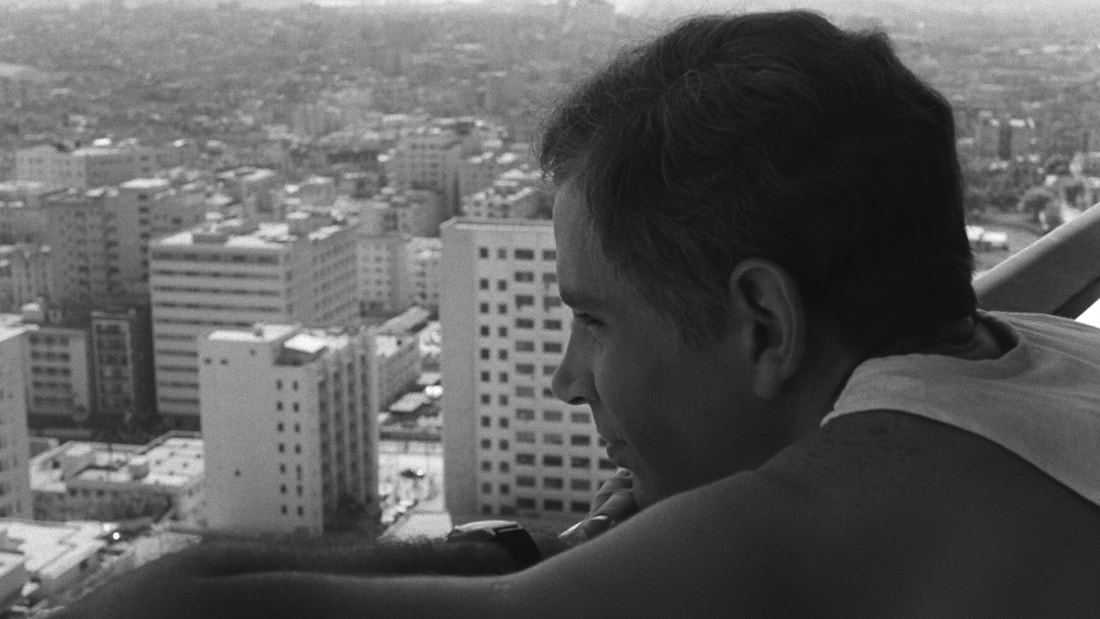|
Offering a documentary-like snapshot into a particular space and time, Tomas Gutierrez Alea's Memories of Underdevelopment transports the viewer to 1961 Cuba, detailing the exploits of an apolitical writer and member of the bourgeouise, Sergio, a man who is unwiling to leave Cuba after the revolution. Seeing his wife and family friends leave for the United States, Sergio refuses to leave, seemingly convinced that he retain his way of life. Socio-political assertions related to Marxist class theory, the intrinsic relationship between capitalism & imperialism, and other various complex issues related to soverignety, freedom, and equality are very much at the core of Memories of Underdevelopment, yet the film remains relatively unique in its deconstruction of such issues due to its reliance on its main characterization, Sergio, a man whose detached from the quickly changing world around him. Memories of Underdevelopment details the socio-political climate of the time through the lens of a man in Sergio who isn't particularly likeable to the average viewer; he is a playboy, a well-educated member of the bourgeouise, whose perspective of the world doesn't particularly align with the revolutionary forces. He isn't an agitatator, just an outsider driven by egoism, and Sergio's perspectives of the quickly changing world provid unique perspective one would not expect from this film, making Memories of Underdevelopment feel far more balanced, astute, and profound than many film's I've seen detailing similar themes. Tomas Gutierrez Alea as a filmmaker shows an unwillingness to simply adhere to the didactic socio-political assertions that all to often craft simplistic binary implications about good and evil, right and wrong, instead delivering a dense, though-provoking piece of cinema about politics but also identity, and the subjective nature of reality when viewed through the lens of the individual. Perhaps Memories of Underdevelopment is best described as a character study with socio-political undertones, as this characterization remains the driving force of the entire film, exhibiting a reflection on the time and space of post-revolution Cuba, with Sergio's own internal existential struggle between intrinsic comforts of the familiar and the existential threat of change manifests itself on a scale that speaks to universal ideas much larger than just this one individual's journey. Sergio is educated and driven heavily by self-improvement, and the impending sense of creeping alienation he feels around him is emotionally resonant, as we witness this headstrong individual slowly crumble under the weight of a rapidly changing environemnt in which his ideals and beliefs are not shared. While he is a character who is hard to like at first, coming off as privledged, materialistic, and autocratic in his beliefs, the film slowly transforms him into a sympathetic character in a lot of ways, questioning the systematic and oppressive nature of authority, something which is often glossed over by many revolutionaries who are dishonest about the toxic nature heirarchy, power, and authority has overall all those, no matter how "good intentioned" they may appear. With this in mind, Memories of Underdevelopment is an astute study of identity, recognizing how we are all hostages to our underlying ideas and perceptions of the world. It is honest in its recognization that as human beings we intrinsically have autocratic tendencies in our overall philosophical beliefs, at least internally, yet the film subtly recognizes how the position of Authority and Power is the problem, as it provides the intrument necessary to inflict one's internal philsophical beliefs on others via force and oppression. For Sergio his general arrogance is his undoing, as he slowly recognizes his mistake in staying in Cuba, believing he can sculp his environment in his own image, a tedious exercise that leaves him in a state of alienation in his homeland. He tries to start over, replace his wife with a new woman in his desired image, and in doing so he becomes a victim of his own autocratic tendencies, a path that leaves him in despair. Sergio's whole plight, his arrogance in the belief that he can craft his environment in his image draws major parallels with United States imperialism, both being driven by an autocratic and absolute belief that they can shape the world in their image, both unwilling to accept that not all individuals or cultures will except their brand of ideas. A film that is ripe for a host of variant political ideologically-driven takes, Tomás Gutiérrez Alea's Memories of Underdevelopment is perhaps first and foremost viewed best through a simplier philosophical lens, one in which systematic authority, often derived through arrogance, power, and absolutes, always ends in oppression.
0 Comments
Leave a Reply. |
AuthorLove of all things cinema brought me here. Archives
June 2023
|

 RSS Feed
RSS Feed
